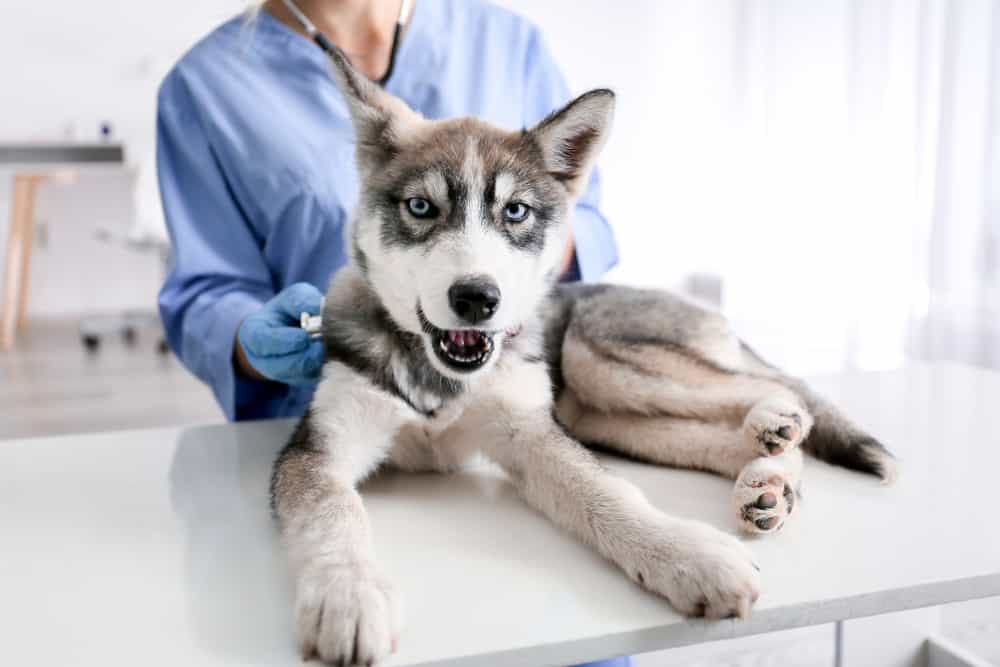“This post contains affiliate links, and I will be compensated if you make a purchase after clicking on my links.”
It is important to book an appointment with your vet within a few days of your new dog arriving home. Starting preventative care early is the best way to ensure your dog’s health and any existing health concerns can be addressed before they pose a serious problem.

Before you go
To prepare your dog for travel, you can take some practice car trips so the trip to the vet will be less unusual. It is important to make sure your dog is secure in a carrier or crate which is comfortable for its size. Dogs can get car sick, so it is best not to feed them just before travel. Before your appointment, you can play with or exercise your dog to help burn away some of their nervous energy. They can also go to the bathroom during this time.
Make a note of any questions that you want to ask the vet about your dog’s health or general care. You should mention this is your dog’s first vet trip when you book your appointment, as the vet may want to allocate a little more time to conduct a thorough examination. You may also request an appointment when the surgery is quieter as this will help you avoid long waiting times. Fewer animals being there will also help keep your dog calm.
Before your visit, try to collect as much information about your dog as possible. Details including their food, appetite, toilet habits, behavioural habits, medicines they have taken, drinking habits and any recent travel can be useful for your vet to gain a full understanding of your dog’s health. The more information you bring the better!
What should you bring?
- Dog crate: line with a familiar blanket, towels, or a shirt that smells of home to help calm your dog
- Smaller dogs can be kept in a carrier as this may make them feel more secure
- Any past health records or veterinary records you have received from the breeder or shelter upon getting your dog
- A leash and collar or harness
- A favourite toy or chew toy for distraction
- Treats to reward good behaviour
- A stool sample if requested
When you arrive
As the vet clinic is a new place with exciting sights and smells, it is important to keep your dog calm. You should use a leash or harness to keep your dog under control. Keeping your dog by your side and away from other animals is a good idea, especially if it is unvaccinated. You can also use treats to reward calm behaviour. If they are particularly over-excited, you can wait with your dog outside until the vet is ready for you.
The examination
During your first visit, the vet will undertake a full physical examination of your dog to confirm their health and make sure their record is up to date. This may include:
- Temperature recording
- A weight check
- Checking the eyes, ears, nose, feet, claws, skin, coat and genitals
- Checking mouth for teeth and gum health
- Joints, reflexes and mobility check
- Heart and lung checks
- Palpitating the lymph nodes, joints and organs in the abdomen
- Sometimes the vet may suggest tests such as x-rays, blood tests or a stool sample to check for intestinal parasites
Your vet will then talk through a vaccination schedule for your dog and any necessary vaccinations may be administered at this time. Flea treatment should be started as soon as possible, alongside worming treatments. Your vet can advise on the best course of action for this.
Depending on your dog’s medical history, your vet may suggest you have them spayed/neutered. They may also ask whether you want your dog microchipped. This is a simple injection that implants a device under the skin. If your dog gets lost, it can be taken to a vet, scanned and reunited with you.
The vet can also advise you on your dog’s diet and breed-specific behaviours. If you have any questions, you can always ask for further clarification, and you can also ask for a demonstration if the vet requires you to administer any medications at home.
Returning home
You can reward your dog at the end of the vet visit with a treat for their good behaviour. This will help gradually train your dog to have positive associations with vet trips. The more comfortable your dog is with the vet; the easier future visits will become. This is important as regular visits to the vets are essential to maintain your dog’s health at any stage of their life.
SynergyVets is a dedicated veterinary recruitment agency, with almost 30 years of collective experience supporting the profession with locum and permanent personnel. They have a great blog which, alongside advice for veterinary candidates, includes useful animal care tips for pet owners.












